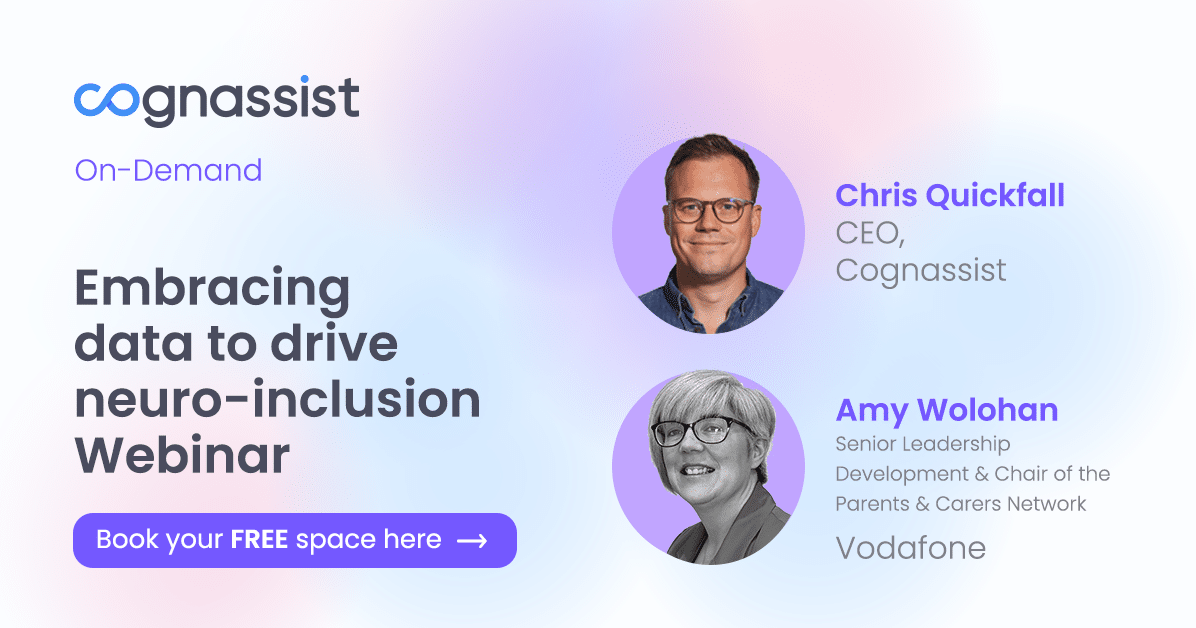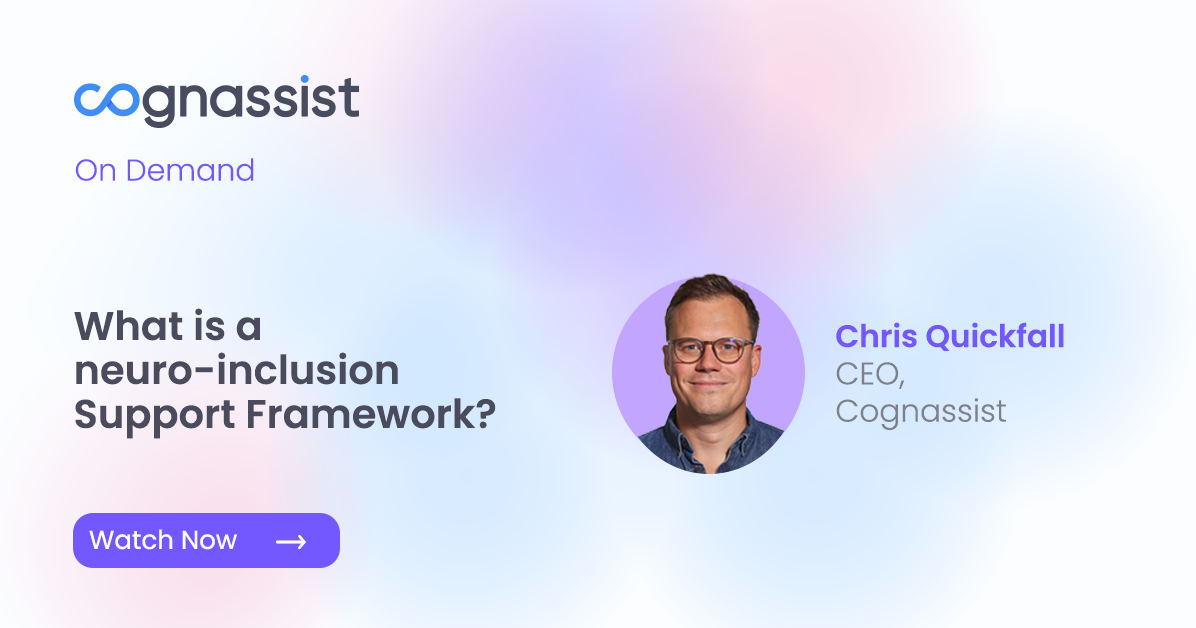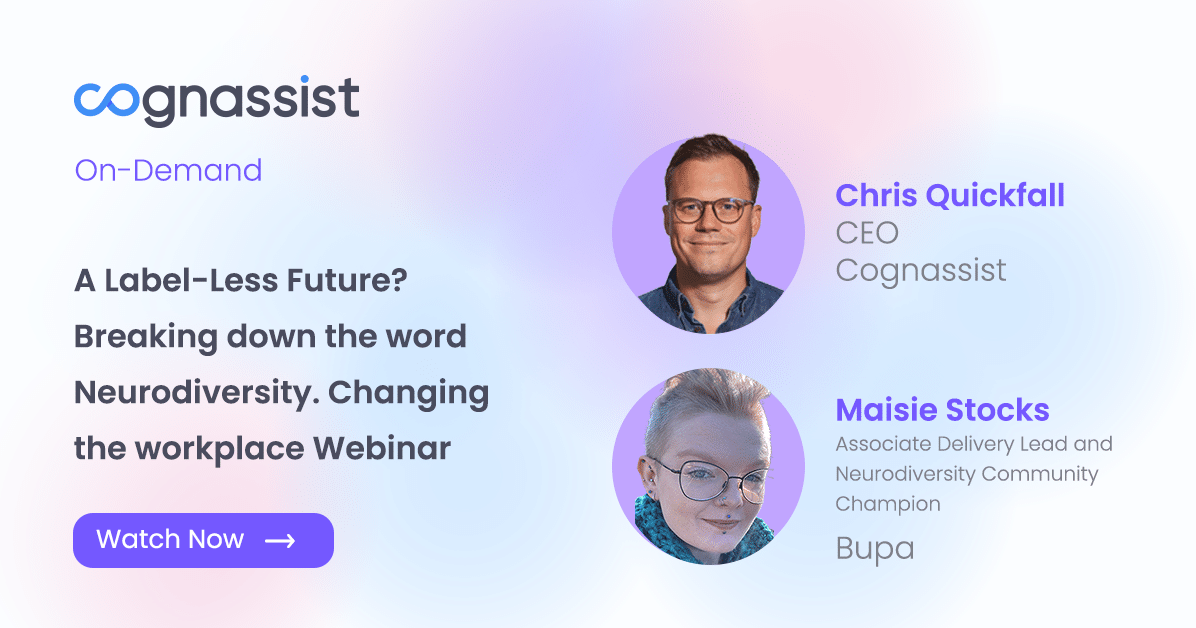Embracing data to drive neuro-inclusion
How do you provide appropriate adjustments when you don’t know if an employee has a neuro-difference?
Ensuring every employee has the support they need to thrive is essential. This becomes even more important when considering individuals who may have cognitive differences that aren’t immediately visible. But how do employers provide suitable adjustments when an employee hasn’t disclosed a neuro-difference?
At Cognassist, we focus on helping organisations build inclusive environments where everyone can succeed, whether or not their differences are visible. Here are key strategies to ensure you’re providing the right support for your team, even when you don’t know specific needs.
Enable an Inclusive Workplace Culture
The foundation of any inclusive environment is culture. When neuro-inclusion is embedded into a company’s values, employees are more likely to feel comfortable sharing their cognitive differences. Encouraging openness around these topics reduces the stigma surrounding disclosure.
Some practical steps include:
– Providing awareness training on cognitive differences for all employees.
– Encouraging open conversations about workplace needs and preferences.
– Establishing champions who advocate for inclusion and can offer support.
At Cognassist, we recommend these strategies to ensure inclusion is at the heart of your organisation, which benefits all employees, not just those with disclosed differences.
Create a Safe Environment with a 2-Way Process
Employees are more likely to share their needs when they feel safe and supported. At Cognassist we train Champions in your organisation to offer support to your colleagues while ensuring complete confidentiality about their neuro-difference, thanks to the Cognassist Neuro-inclusion Support Framework. Our platform enables organisations to provide tailored support from an internal advocate for neuro-inclusion to all employees, all while preserving their privacy.
Focus on Strengths and Individuality
Instead of focusing on what an employee may find challenging, shift the attention to their strengths. Employees with cognitive differences often bring unique skills to the table, such as innovative problem-solving or high attention to detail. By focusing on strengths, managers can help employees excel in areas where they naturally perform well.
This approach requires flexibility, recognising that productivity doesn’t look the same for everyone. By supporting employees’ unique strengths, you can create a more adaptive and efficient team.
Implement General Workplace Adjustments
Some adjustments benefit everyone, regardless of whether they have a neuro-difference or not. These proactive adjustments can foster an inclusive environment without requiring disclosure. Examples include:
– Offering flexible working hours or hybrid work models.
– Providing clear, structured communication, with key points summarised.
– Creating quiet areas or providing noise-cancelling headphones.
– Allowing regular breaks to improve focus and reduce stress.
By embedding these kinds of adjustments into the workplace, you create an environment where employees can thrive without feeling pressured to disclose personal details to get support.
Leverage Technology to Support Cognitive Differences
Technology offers powerful solutions for employees who may benefit from tailored support. At Cognassist, our platform helps individuals understand their cognitive profiles and provides personalised strategies for improving productivity, based on their specific role.
Offering access to tools like these can provide practical, immediate support, ensuring employees have the resources they need to work in ways that best suit them. By using this kind of technology, you show a commitment to inclusion, without waiting for employees to disclose personal information.
Equip Managers to Recognise and Respond
Managers play a crucial role in supporting employees with cognitive differences, even when they’re not visible. Providing them with neuro-inclusion training can help them recognise when an employee might benefit from adjustments, even if they haven’t disclosed a specific need. Some signs to look out for include:
– Difficulty concentrating for extended periods.
– Struggles with multitasking or prioritising.
– Preference for quieter, less stimulating workspaces.
By becoming attuned to these signals, managers can offer sensitive support, ensuring employees feel comfortable and valued without needing to disclose anything.
Your Next Steps
Providing appropriate adjustments when you don’t know if an employee has a neuro-difference requires a proactive, inclusive approach. By focusing on strengths, implementing flexible adjustments, and fostering an open, supportive culture, you can create a workplace where all employees—regardless of their needs—can thrive.
At Cognassist, we offer tools and guidance to help organisations support their workforce and ensure everyone has the opportunity to reach their full potential. Get in touch if you would like to discuss in more detail.
Related Content


